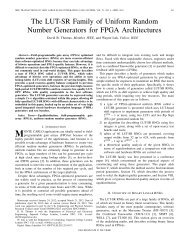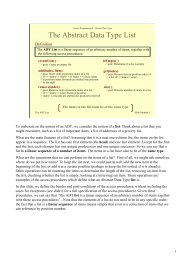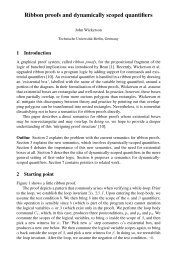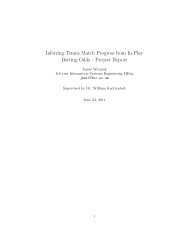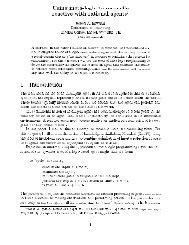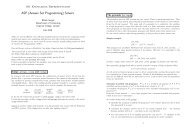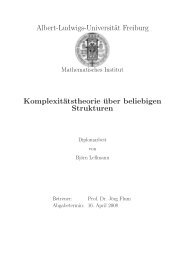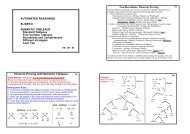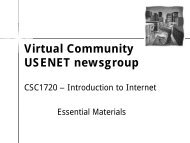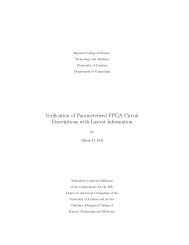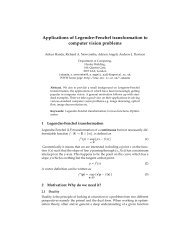A Survey of Monte Carlo Tree Search Methods - Department of ...
A Survey of Monte Carlo Tree Search Methods - Department of ...
A Survey of Monte Carlo Tree Search Methods - Department of ...
You also want an ePaper? Increase the reach of your titles
YUMPU automatically turns print PDFs into web optimized ePapers that Google loves.
IEEE TRANSACTIONS ON COMPUTATIONAL INTELLIGENCE AND AI IN GAMES, VOL. 4, NO. 1, MARCH 2012 40<br />
or to capture rules in sufficient detail. Hybridisation <strong>of</strong><br />
MCTS with traditional approaches provides a rich area<br />
for future research, which we will discuss further below.<br />
This survey has demonstrated the power <strong>of</strong> MCTS<br />
across a wide range <strong>of</strong> game domains, in many cases<br />
providing the strongest computer players to date. While<br />
minimax search has proven to be an effective technique<br />
for games where it is possible to evaluate intermediate<br />
game states, e.g. Chess and Checkers, MCTS does not<br />
require such intermediate evaluation and has proven<br />
to be a more robust and general search approach. Its<br />
success in such a wide range <strong>of</strong> games, and particularly<br />
in General Game Playing, demonstrates its potential<br />
across a broad range <strong>of</strong> decision problems. Success in<br />
non-game applications further emphasises its potential.<br />
8.2 Strengths<br />
Using MCTS, effective game play can be obtained with<br />
no knowledge <strong>of</strong> a game beyond its rules. This survey<br />
demonstrates that this is true for a wide range <strong>of</strong> games,<br />
and particularly for General Game Playing, where rules<br />
are not known in advance. With further enhancement<br />
to the tree or simulation policy, very strong play is<br />
achievable. Thus enhanced, MCTS has proven effective<br />
in domains <strong>of</strong> high complexity that are otherwise opaque<br />
to traditional AI approaches.<br />
Enhancements may result from incorporating human<br />
knowledge, machine learning or other heuristic approaches.<br />
One <strong>of</strong> the great advantages <strong>of</strong> MCTS is that<br />
even when the information given by an enhancement<br />
is noisy or occasionally misleading, the MCTS sampling<br />
approach is <strong>of</strong>ten robust enough to handle this noise and<br />
produce stronger play. This is in contrast with minimax<br />
search, where the search is brittle with respect to noise<br />
in the evaluation function for intermediate states, and<br />
this is especially true for games with delayed rewards.<br />
Another advantage <strong>of</strong> MCTS is that the forward sampling<br />
approach is, in some ways, similar to the method<br />
employed by human game players, as the algorithm will<br />
focus on more promising lines <strong>of</strong> play while occasionally<br />
checking apparently weaker options. This is especially<br />
true for new games, such as those encountered in the<br />
AAAI General Game Playing competitions, for which no<br />
strategic or heuristic knowledge exists. This “humanistic”<br />
nature <strong>of</strong> MCTS makes it easier to explain to the<br />
general public than search paradigms that operate very<br />
differently to the way in which humans search.<br />
MCTS is <strong>of</strong>ten effective for small numbers <strong>of</strong> simulations,<br />
for which mistakes <strong>of</strong>ten appear plausible to<br />
human observers. Hence the approach is genuinely an<br />
“anytime” approach, producing results <strong>of</strong> plausibility<br />
that grows with increasing CPU time, through growing<br />
the tree asymmetrically.<br />
8.3 Weaknesses<br />
Combining the precision <strong>of</strong> tree search with the generality<br />
<strong>of</strong> random sampling in MCTS has provided stronger<br />
decision-making in a wide range <strong>of</strong> games. However,<br />
there are clear challenges for domains where the branching<br />
factor and depth <strong>of</strong> the graph to be searched makes<br />
naive application <strong>of</strong> MCTS, or indeed any other search<br />
algorithm, infeasible. This is particularly the case for<br />
video game and real-time control applications, where a<br />
systematic way to incorporate knowledge is required in<br />
order to restrict the subtree to be searched.<br />
Another issue arises when simulations are very CPUintensive<br />
and MCTS must learn from relatively few samples.<br />
Work on Bridge and Scrabble shows the potential <strong>of</strong><br />
very shallow searches in this case, but it remains an open<br />
question as to whether MCTS is the best way to direct<br />
simulations when relatively few can be carried out.<br />
Although basic implementations <strong>of</strong> MCTS provide<br />
effective play for some domains, results can be weak if<br />
the basic algorithm is not enhanced. This survey presents<br />
the wide range <strong>of</strong> enhancements considered in the short<br />
time to date. There is currently no better way than a<br />
manual, empirical study <strong>of</strong> the effect <strong>of</strong> enhancements to<br />
obtain acceptable performance in a particular domain.<br />
A primary weakness <strong>of</strong> MCTS, shared by most search<br />
heuristics, is that the dynamics <strong>of</strong> search are not yet fully<br />
understood, and the impact <strong>of</strong> decisions concerning parameter<br />
settings and enhancements to basic algorithms<br />
are hard to predict. Work to date shows promise, with<br />
basic MCTS algorithms proving tractable to “in the limit”<br />
analysis. The simplicity <strong>of</strong> the approach, and effectiveness<br />
<strong>of</strong> the tools <strong>of</strong> probability theory in analysis <strong>of</strong><br />
MCTS, show promise that in the future we might have<br />
a better theoretical understanding <strong>of</strong> the performance <strong>of</strong><br />
MCTS, given a realistic number <strong>of</strong> iterations.<br />
A problem for any fast-growing research community is<br />
the need to unify definitions, methods and terminology<br />
across a wide research field. We hope that this paper<br />
may go some way towards such unification.<br />
8.4 Research Directions<br />
Future research in MCTS will likely be directed towards:<br />
• Improving MCTS performance in general.<br />
• Improving MCTS performance in specific domains.<br />
• Understanding the behaviour <strong>of</strong> MCTS.<br />
MCTS is the most promising research direction to<br />
date in achieving human-competitive play for Go and<br />
other games which have proved intractable for minimax<br />
and other search approaches. It seems likely that there<br />
will continue to be substantial effort on game-specific<br />
enhancements to MCTS for Go and other games.<br />
8.4.1 General-Purpose Enhancements<br />
Many <strong>of</strong> the enhancements that have emerged through<br />
the study <strong>of</strong> Go have proven applicable across a wide<br />
range <strong>of</strong> other games and decision problems. The empirical<br />
exploration <strong>of</strong> general-purpose enhancements to<br />
the MCTS algorithm will likely remain a major area <strong>of</strong><br />
investigation. This is particularly important for MCTS, as<br />
the approach appears to be remarkably general-purpose



